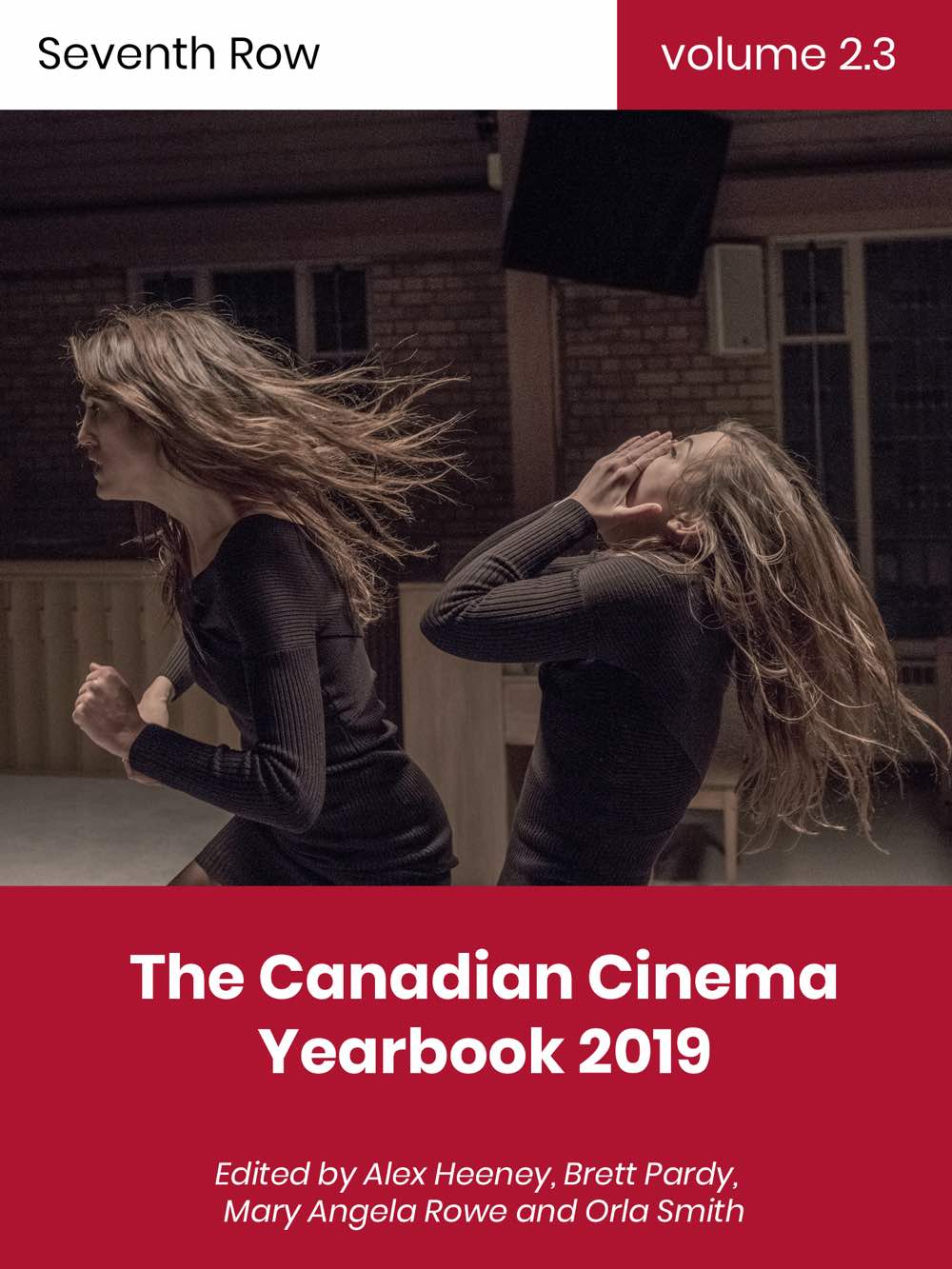Seventh Row editors Alex Heeney and Orla Smith pick the best Canadian films of 2019.
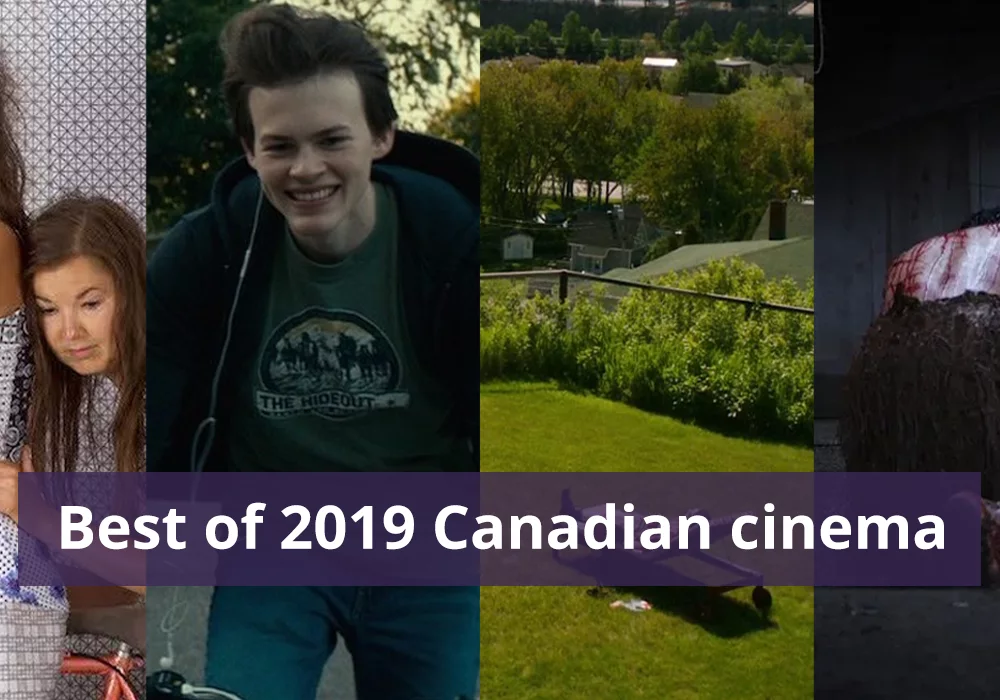
2019 was a landmark year for Canadian cinema. We loved so many of these films (Mouthpiece even made our list of the ten best films of the decade) that earlier this year we published a book, The 2019 Canadian Cinema Yearbook, dedicated to chronicling and celebrating the ecstatic highs of recent Canadian cinema.
Now, after TIFF has released their annual Canada’s Top Ten list, we want to have our say on the best Canadian films of the year. Covering Canadian cinema is a priority of ours, and we do our best to screen and cover most Canadian films that come out in any given year. Here’s our summation of everything we saw in 2019.
Best Canadian films released in 2019
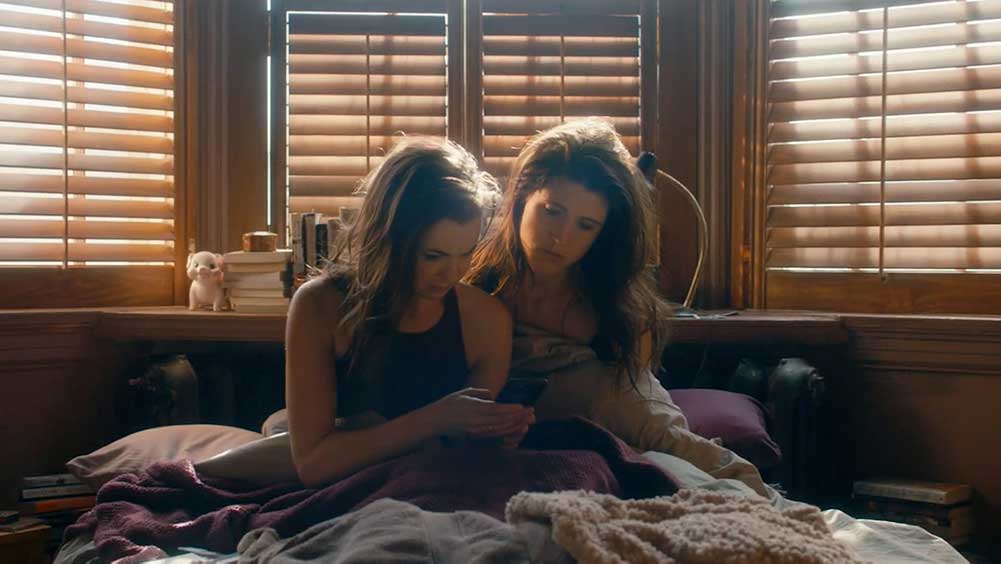
1. Mouthpiece (dir. Patricia Rozema)
“The film’s innovative conceit is that the main character, thirty-something Torontonian Cassandra, is simultaneously played by two actors, Nostbakken and Sadava. This dual performance allows them to represent two sides of a complex woman who is constantly in conflict with herself. It’s a meditation on the things we think and the things we do, and how they can be contradictions, how every moment is charged with multiple emotions.” READ MORE >>
2. The Body Remembers When the World Broke Open (dir. Kathleen Hepburn, Elle-Máijá Tailfeathers)
“The Body Remembers When the World Broke Open is a rare film: not only does it centre women’s often invisible experiences, but it also features a cross-cultural encounter between two Indigenous women from different nations and socio-economic backgrounds.” READ MORE >>
3. One Day in the Life of Noah Piugattuk (dir. Zacharias Kunuk)
Based on the real encounter between Inuk leader Noah Piugattuk and a Canadian government official in the 1950s, Kunuk’s film is the story of colonialism in process. The centrepiece of the film is an hour-long exchange, which involves communication barriers with things lost in translation between the two men. Kunuk’s blocking renders this verbal jousting match a battle for power, and offers the terrifyingly depressing sense that the battle was won before it began by the white official.
4. Giant Little Ones (dir. Keith Behrman)
“Keith Behrman’s Giant Little Ones is one of the great teen movies of the decade — vibrant, fun, and moving, and everything changes so fast you hardly realise it. And yet writer-director Behrman also manages to tackle weighty issues without ever veering into afternoon special territory or getting didactic.” READ MORE >>
5. Jeune Juliette (dir. Anne Émond)
“Anne Émond’s fourth feature, Jeune Juliette, is an absolutely delightful and body positive teen comedy about 14-year-old Juliette, a smart and savvy outsider who is coming to terms with her own identity and how people treat her because she is plump.” READ MORE >>
6. Edge of the Knife (dir. Gwaai Edenshaw, Helen Haig-Brown)
“Sgaawaay K’uuna (Edge of the Knife) is the first feature film made entirely in the endangered Haida language, currently spoken by less than 20 people. Set in the 19th century on the Haida Gwaii islands off Canada’s pacific coast, the film tells the Haida legend of ‘the Wildman’.” READ MORE >>
7. The Fireflies are Gone (dir. Sébastien Pilote)
“‘Remember how it used to be,’ says Léo (Karelle Tremblay), the teenage protagonist of Sébastien Pilote coming-of-age story, The Fireflies are Gone (La Disparition des Lucioles). A month away from graduating high school, Léo is already cynical about the world she’ll be entering as an adult. Her parents split up, and her stepfather, the local right-wing radio personality, helped push her union organizer father out of his job and out of the city; he now works up north.” READ MORE >>
8. Genèse (dir. Philippe Lesage)
“Philippe Lesage’s new film, Genèse, exists in a transient emotional landscape, examining the parallel fates of a brother and sister, Guillaume (Théodore Pellerin) and Charlotte (Noée Abita), who are navigating love and identity in their late adolescence. While, on the surface, this is a traditional coming-of-age tale, a melodrama of hormonal lust and self-discovery, it abandons traditional point A to point B storytelling.” READ MORE >>
9. Firecrackers (dir. Jasmin Mozaffari)
“Firecrackers follows the template of many a coming-of-age tale before it: a restless teen long to escape their oppressive small town home. Big fish in a small pond, or a small Fish Tank, to cite the 2009 Andrea Arnold film with which Firecrackers shares so much DNA. It’s all the more impressive, then, that this old story feels fresh and immediate in Mozaffari’s hands.” READ MORE >>
10. The Great Darkened Days (dir. Maxime Giroux)
“An absurdist and atemporal fable about the rot and corruption of capitalism, Maxime Giroux’s The Great Darkened Days represents a radical departure from his work in his previous effort, Félix and Meira.” READ MORE >>
Best Canadian world premieres in 2019
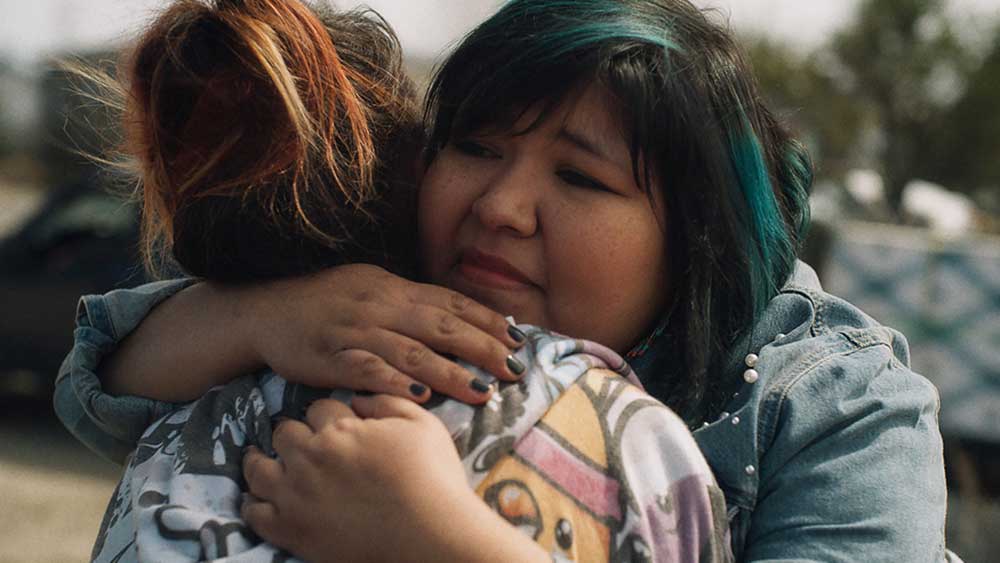
Anne at 13,000 ft (dir. Kazik Radwanski)
Antigone (dir. Sophie Deraspe)
The Body Remembers When the World Broke Open (dir. Kathleen Hepburn, Elle-Máijá Tailfeathers)
Jeune Juliette (dir. Anne Émond)
Jordan River Anderson, The Messenger (dir. Alanis Obomsawin)
Kuessipan (dir. Myriam Verreault)
Murmur (dir. Heather Young)
No Crying at the Dinner Table (dir. Carol Nguyen)
One Day in the Life of Noah Piugattuk (dir. Zacharias Kunuk)
The Rest of Us (dir. Aisling Chin-Yee)
The Canadian rising stars of 2019
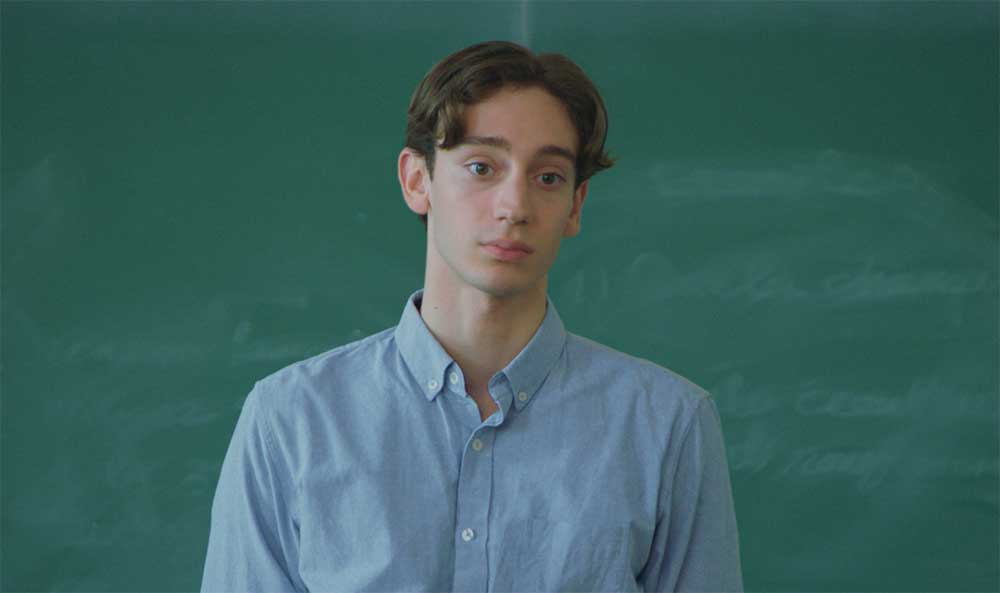
Matthieu Bouchard-Malo (Editor of First Stripes, Genèse, and The Great Darkened Days)
We just had to interview Bouchard-Malo for our Canadian Cinema Yearbook when we discovered that he edited so many of the best Canadian films of the year: “When I receive the material to edit a scene for fiction, I don’t dream of images that don’t exist. I work with what I have, and I work towards what is needed. If there are only three shots for a whole scene, I’m not going to dream of a fourth setup. There is usually a reason why it was shot that way. I like to work with constraints. Whether I have three of fifteen shots to work with, I am always looking for the best way to construct a scene.” – Matthieu Bouchard-Malo, READ MORE >>
Deragh Campbell (Star of Anne at 13,000ft; Writer-Director-Star of MS Slavic 7)
We were first impressed by Campbell’s remarkable performance in Anne at 13,000 ft, a project that involved close collaboration between director and star. Then Campbell further proved her talents as a creator as well as an actress on MS Slavic 7: “I have a lot of faith in language and its ability to, with some difficulty, of course, articulate how you feel. Audrey wants to be close to her great grandmother, and she wants to experience the significance of the letters, but it is a little bit difficult. She can’t just look at them and fully emotionally experience it. She has to engage with language in order to be able to find meaning in it.” – Deragh Campbell on MS Slavic 7, READ MORE >>
Sharon Ishpatao Fontaine (Star of Kuessipan)
There were countless coming-of-age films at TIFF this year, but Kuessipan’s Mikuan (played by Fontaine) is a character that stood out, largely because of the actresses huge charisma: “Mikuan (a stunning lead performance from Sharon Ishpatao Fontaine) is such a compelling character because there’s so much to her: witty, stubborn, loyal, sharply intelligent yet still a naïve and idealistic sixteen-year-old.” READ MORE >>
Michaela Kurimsky (Star of Firecrackers)
As Lou in the fast-paced coming-of-age film Firecrackers, Kurimsky is a revelation, perfectly capturing teenage vulnerability and performativity. She’s a brash and often aggressive girl (because that’s how she needs to present to get by) but when we watch her alone, she opens up and softens: “Jasmin actually gave me the idea to ask myself what kind of an animal Lou would be. So I went to a man who had snakes, and I just touched them to find out what they felt like. I tried to involve myself in a very tactile way.” – Michaela Kurimsky, READ MORE >>
Catherine Lutes (Cinematographer of The Disappearance at Clifton Hill, Firecrackers, and Mouthpiece)
Lutes is one of the most exciting emerging cinematographic talents we have. Just this year she’s shown signs of great versatility (just compare the starkly different but both clearly defined aesthetics of Firecrackers and Mouthpiece) as well as examples of visual innovation, such as with this anecdote from the Mouthpiece set: “Any time a frame looked too normal, she would also mess it up somehow, either by shooting through something… She took her lip gloss and said, “It looks too normal,” and put it on the actual lens so she was shooting through something.” – Norah Sadava, writer and star of Mouthpiece, READ MORE >>
Jasmin Mozaffari (Writer-Director of Firecrackers)
Mozaffari manages to make the age old ‘teens who want to escape their home town for the big city’ trope feel fresh, and that’s no easy feat: “With [the character of] Lou, I told [star] Michaela [Kurimsky] not to go and watch a bunch of movies, because I didn’t want her to think, “Oh, this is the performance she’s trying to get out of me.” It’s better to try and access a character from real life” – Jasmin Mozaffari, READ MORE >>
Carol Nguyen (Director of No Crying at the Dinner Table)
Nguyen amazed us with her short film No Crying at the Dinner Table, which was one of the best films we saw at TIFF, short or feature: “This film was supposed to be a documentary about something else, actually. In the midst of research for that film, I decided to ask my parents and sister about personal experiences in their lives. What I got from those conversations were stories I had never heard from them before.” – Carol Nguyen, READ MORE >>
Amy Nostbakken and Norah Sadava (Writers-Stars of Mouthpiece)
Nostbakken and Sadava adapted their experimental theatre piece to the screen in a radical, inventive, overwhelmingly successful way. They’re a force to be reckoned with: “It’s the two of us playing one woman, wearing white bathsuits with nothing on stage except a white bathtub and microphone. We play all the characters and everything you see in the film, we do and we create the settings. One of the interesting parts of the translation from stage to screen was we did a preliminary shoot to make sure that we could act on film. We asked for it.” – Amy Nostbakken, READ MORE >>
Théodore Pellerin (Star of Genèse and On Becoming a God in Central Florida)
Pellerin is such an undeniable talent that 7R writer Justine Smith wrote a career analysis in our Canadian Cinema Yearbook: “Pellerin’s ability to play two contradictory emotions at once is a major element of his resonance as an actor. He can be hyper-confident and intensely vulnerable all in the same moment. With a glance, or a twitch of the eye, he can convey a deep inner turmoil, drawing us deeper.” READ MORE >>
Elle-Máijá Tailfeathers (Writer-Director-Star of The Body Remembers When the World Broke Open; Star of Blood Quantum)
Multi-hyphenate talent Tailfeathers took a brief but thought provoking experience from her own life and turned it into the brilliant The Body Remembers When the World Broke Open: “It was ultimately about honouring that original experience which was very short. I encountered this young woman who was in distress. I spent a few hours with her, and then I never saw her again. That experience really left a deep and profound impact on me.” – Elle-Máijá Tailfeathers, READ MORE >>
Karelle Tremblay (Star of The Fireflies are Gone)
In The Fireflies are Gone, Tremblay creates a memorable, cynical teen girl character who’s almost like the Holden Caulfield of our time: “I was working on a TV show for teenagers that I decided to quit in order to focus more on cinema. I think I’m in need of more challenges. Maybe I’m a bit tired of playing roles that are very close to who I am. I’d like to play a really feminine woman, who’s maybe a bit bitchy.” – Karelle Tremblay, READ MORE >>
Heather Young (Writer-Director of Murmur)
Young’s short film Milk was a highlight of TIFF 2017, so we were delighted to see her win the Discovery prize at TIFF this year for her feature debut Murmur: “I wanted to focus on her face. It [often] seems like she doesn’t have a say in what’s happening to her. I liked the idea of these anonymous characters that feel like they know what’s best, but it’s impersonal. Without seeing them, it emphasizes the impersonal nature of her interactions with these authoritarian figures.” – Heather Young, READ MORE >>
Mara Zigler (Costume designer of American Woman, Firecrackers, and Mouthpiece)
Zigler was nominated for a Canadian Screen Award for her work on Firecrackers, which is only one example of her great work in Canadina film this year: “Mara’s very good at being like, “Why would a character wear this, this, and this?” We thought specifically of Lou: why is she dressing in androgynous clothes? We decided the reason why is that she has trauma from her younger years, and she also doesn’t like to be sexualised by men. She almost wears her clothes as a suit of armour to keep people from looking at her physicality. At the same time, she’s not afraid to be naked in the bathroom with Chantal.” – Jasmin Mozaffari, director of Firecrackers, READ MORE >>
